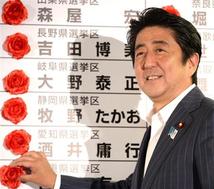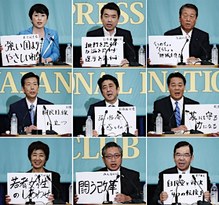 Source: yahoo.co.jp
Source: yahoo.co.jp For the DPJ, the result was, not to put too fine a point on it, an unmitigated disaster, with the DPJ’s presence in the Upper House crashing from 86 to 59, a drop in 27 seats and indicative of the degree of latent public dissatisfaction in the DPJ’s performance while it was in government. The Communist Party of Japan, meanwhile, managed to secure 8 extra seats, thereby boosting its numbers to 11(primarily in areas where Communist Party representation has been strongest – namely Tokyo, Kyoto, and Osaka). As for more minor parties, there was nought but bad news, with the People’s Lives Come First Party, the Green Wind Party, Reform Party, and Happiness Party all failing to secure any seats, therefore either condemning them to historical irrelevancy (J) or at least some attempt at internal reform.
Given that this election has focused on the potential for the Abe government to release the ‘’third’’ arrow in its quiver of economic reforms, the presence of greater numbers of Coalition members in the Upper House raises a number of questions. If the Abe government is committed to reform, will Abe be able to overcome the vested interests of his party to commit Japan to participation in the TPP? Will he be able to remake Japan’s business environment in order to encourage foreign investment, further liberalise the labour market, remove government subsidies to rural electorates, continue with re-construction efforts in the Tohoku region (which itself has been a missing issue in this electoral cycle), and commit Japan to defence reform, thereby altering the Constitution to recognise Japan’s right to collective self defence?
In relation to the TPP, it appears that the LDP managed to pick a considerable number of votes in rural electorates, meaning that the issue of exemptions as a pre-condition to participation in the TPP will become even more crucial. As the Abe government has placed prioritised economic growth (J), any move to blunt the commitment of Japan to the TPP will be harshly judged by the Keidanren, not to mention other participating countries, who will take any hesitation by Japan as a sign that Abe’s reform agenda is rhetoric devoid of resolve. Not only this, both the Restoration Party and the Your Party have emphasised the need for Japan to join in as many economic initiatives as it can so as to offset any advantages held by China and South Korea in trade negotiations. If the Abe government reneges on its commitments both parties could withdraw their support, although given the size of the Coalition’s majority in the Upper House, such a threat may only derail the more audacious reforms (i.e., constitutional revision) while leaving scope for negotiation on the economy.
The most pressing issue, as far as the rest of the region is concerned, is just what PM Abe plans to do about the Japanese Constitution, and what he may have in mind vis-à-vis apologetic statements for wartime behaviour. Although Chief Cabinet Secretary Suga has reiterated on numerous occasions that the Coalition has no plans to re-write the Kōnō and Murayama Statements, the region (or more correctly, South Korea and China) has not been mollified. Moreover, as such pronouncements were made before the Upper House election, it behoves some enterprising members of Japan’s journalistic world to ask whether some revision of history is about to take place. Of course, while the Abe government may seek to make some adjustments to the statements, it may choose not to do so right now, certainly not when it depends on regional cooperation to deal with the growing Chinese threats to territorial sovereignty.
This is where questions on Constitutional revision become even more interesting, particularly for those countries (like Australia) which maintain friendly relations with Japan and have every hope that Japan will continue along its reform path. A re-write of Article 9 of the Constitution could give Japan the right to engage in collective self defence, meaning that Japan could initiate offensive operations against perceived threats in order to pre-empt an attack against its forces, territory, or, more broadly, interests. Not only this, it could pave the way for a broader interpretation of ‘defence’, including the need for firmer military ties with other regional nations part of which would involve the exchange of technological know-how, thereby building the military capabilities of these nations and thus ultimately helping to contribute to Japan’s ‘defence’.
All this is speculative at the moment, and any commentary claiming to know precisely how the Japanese government will act will need a water-tight source within the Abe Cabinet to have any credibility. Nonetheless, PM Abe had plenty of time in the interim years between his resignation in 2007 and his resurrection as PM in 2012 to map out a plan for growth and structural reform. So far what we have witnessed is that plan being put into place, with each step providing the means to bring about change. With both Houses now under Coalition control, PM Abe has the ability to realise his ambitions as the heir to Kishi Nobusuke, and that will make the next few months of Japanese politics quite riveting.


 RSS Feed
RSS Feed